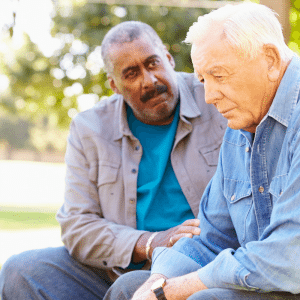Good Grief
As we get older, it is a fact of life that we will lose more people who are dear to us. It is a part of how life works. Those we've grown up emulating are getting older, those we've grown up with are aging. Many of our elderly friends and family have already lost a large number of loved ones. The problem with death is that it never comes at an opportune time. And grief? Grief doesn't come at an opportune time either. It is a complicated and untimely beast. So how can we help our friends and loved ones who are grieving? How can we recognize grief when it strikes us or someone we love?
There are several common stages of grief. These stages seem easy to understand and in a logical order on paper, but remember that they are not easy to go through. They also do not seem to come in a logical order in most people. Recognizing them may help as you grieve, and they may also be beneficial as you help someone else navigate the grief process.
Denial is often the first stage of grief. Some people describe it as unbelief that the loved one has passed on. Others describe it as “surreal” or as if they're walking around in a daze or a fog. It is really shock that they are experiencing. It takes one's brain a bit of time to catch up with reality. If your reality has included a living person for a great number of years, it will be very difficult for your brain to understand that they are no longer alive. This stage can be helpful if it comes first, as it might buy you some time, without emotion, to attend to funeral preparations or travel plans.
Another stage is called bargaining. This is usually when you wonder what you could've done to prevent the death of a loved one. Or you wish that it could have been you instead of them. This is natural as we tend to self-evaluate if everything that should have been done was done for them. Did we give our best effort to save them, did those who were with them give their best effort?
Anger might come next, especially if we perceive that more should have been done by ourselves or someone else. Anger also is sometimes directed at the loved one for leaving us in this world with no recourse but to accept that they are gone. They may have left many things undone, in our estimation, and it seems unfair that we have to pick up the pieces of their death.
Depression is common after this because we realized that we can't remain angry forever with them, with ourselves and with others. Anger is also a very exhausting emotion . When the anger is spent, a deep weariness can come in waves. Extra sleep might be required. An inability to just move on with life is common. Getting over-tired can sometimes result in an inability to sleep at all or to eat properly. This is a stage to have a strong support system in place.
Finally, acceptance is the final stage. There is no set period of time to determine when acceptance will occur. It is different for each person. It might make it easier if you knew of someone's imminent death because they had a terminal disease, but not always. Some people hold on to such hope despite prognosis that it is still a great shock to them at the time of death.
If you are helping someone else deal with grief, be sure to listen to the words and stories that they are telling you. Taking the time to listen and care about the memories and relationship that they had with that person will encourage them to talk and process the memories. Encourage them to let emotions out without using phrases like, “Everything happens for a reason” or “They're in a better place”. Those statements might be true, but they are entirely overused and might not seem genuine to the person that is grieving, especially if they are in the anger stage. If you notice that the person you are supporting seems stuck in a state of depression for an extended period of time, suggest that they might want to see a therapist just to get help processing what is happening to them. Finally, show that you love them in whichever way they can best accept it. If they want to sit in silence, it is perfectly acceptable to sit with them .
Grief is a strange and slippery thing. Finding life on the other side of it is possible. It just may not look the same as it did before.





